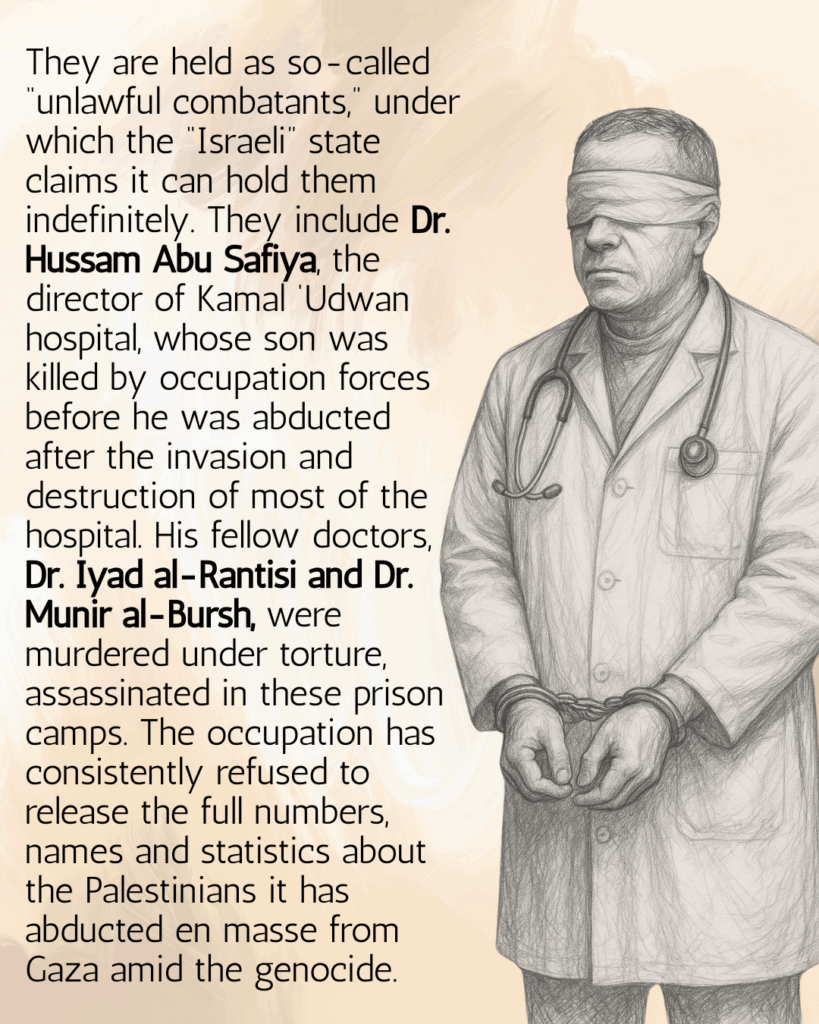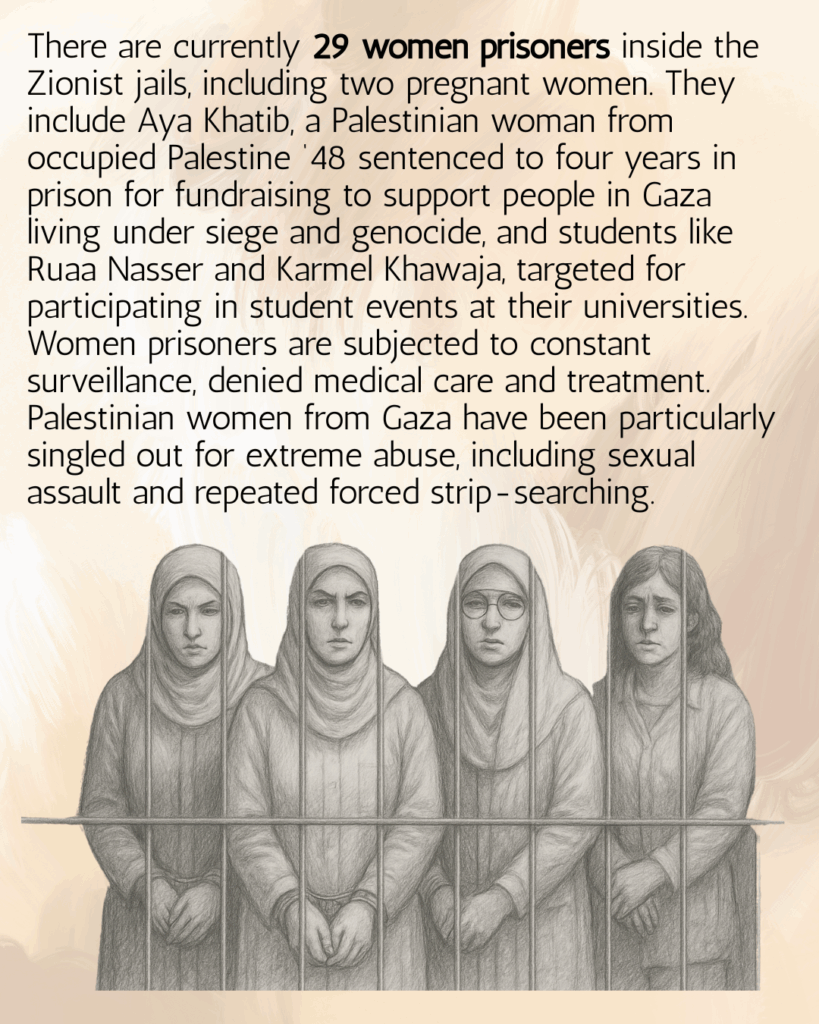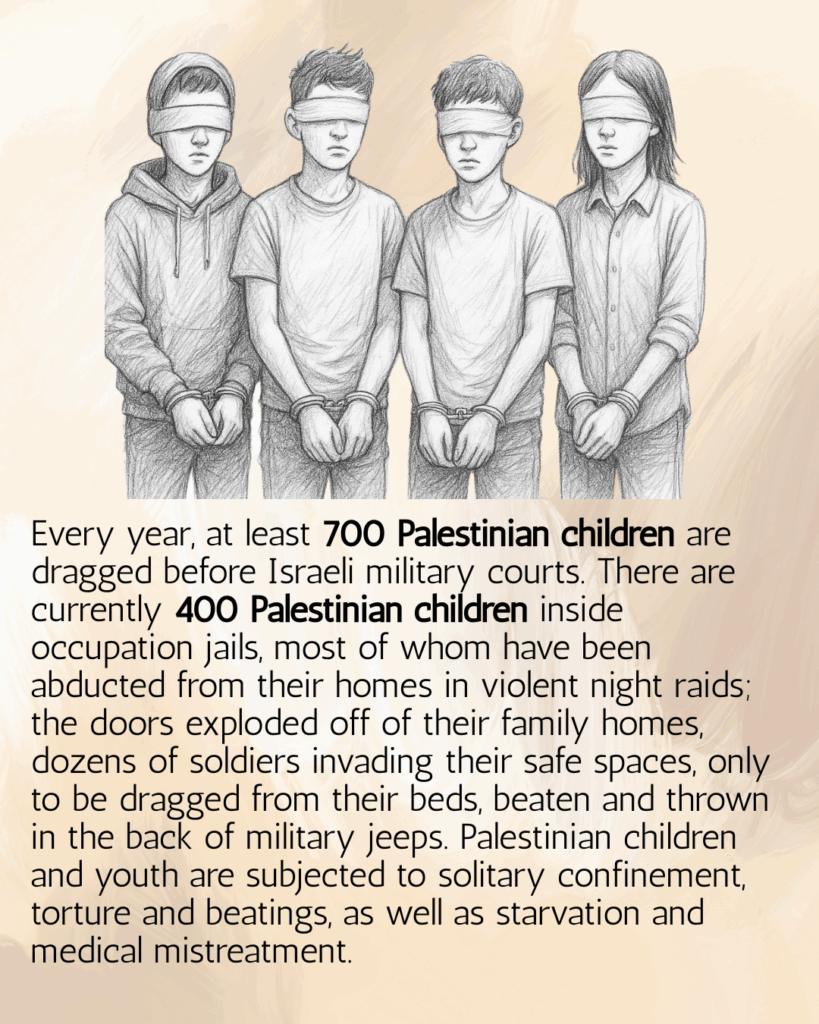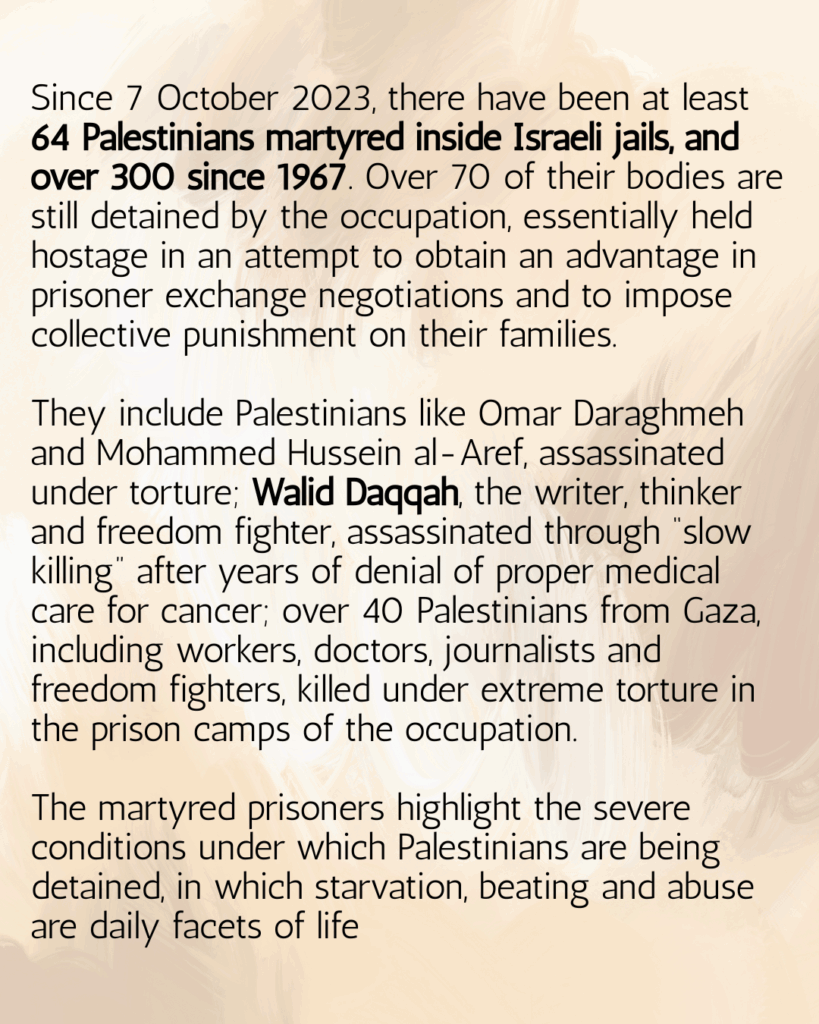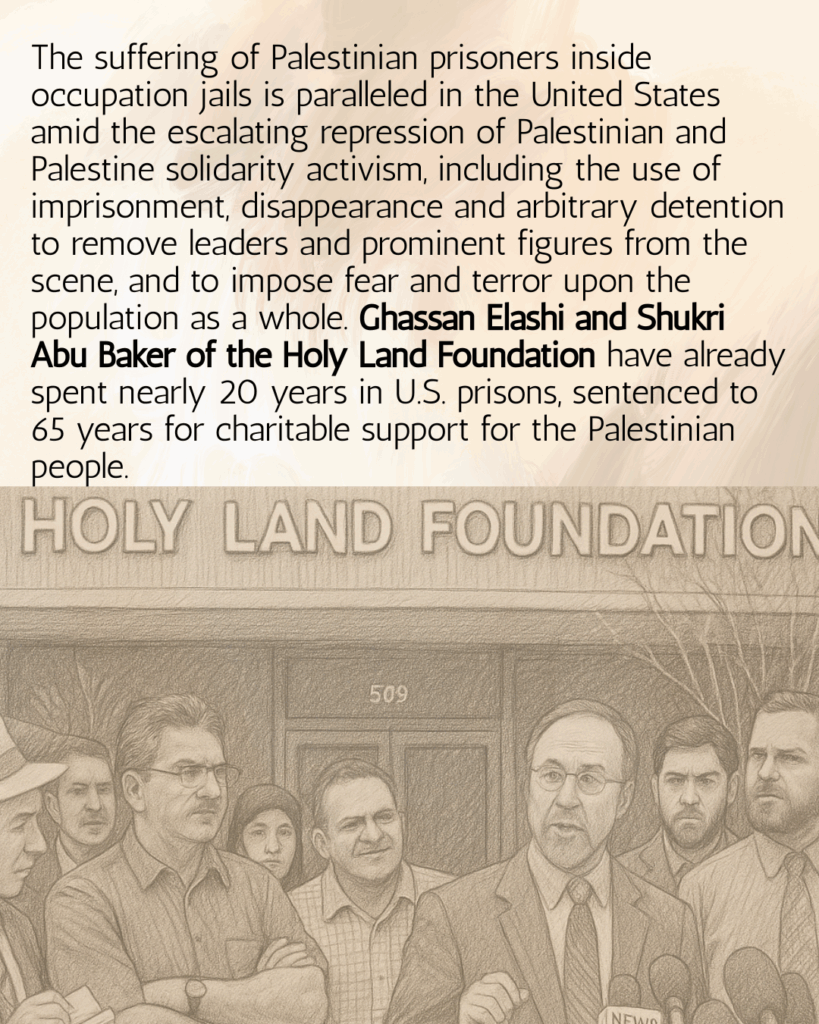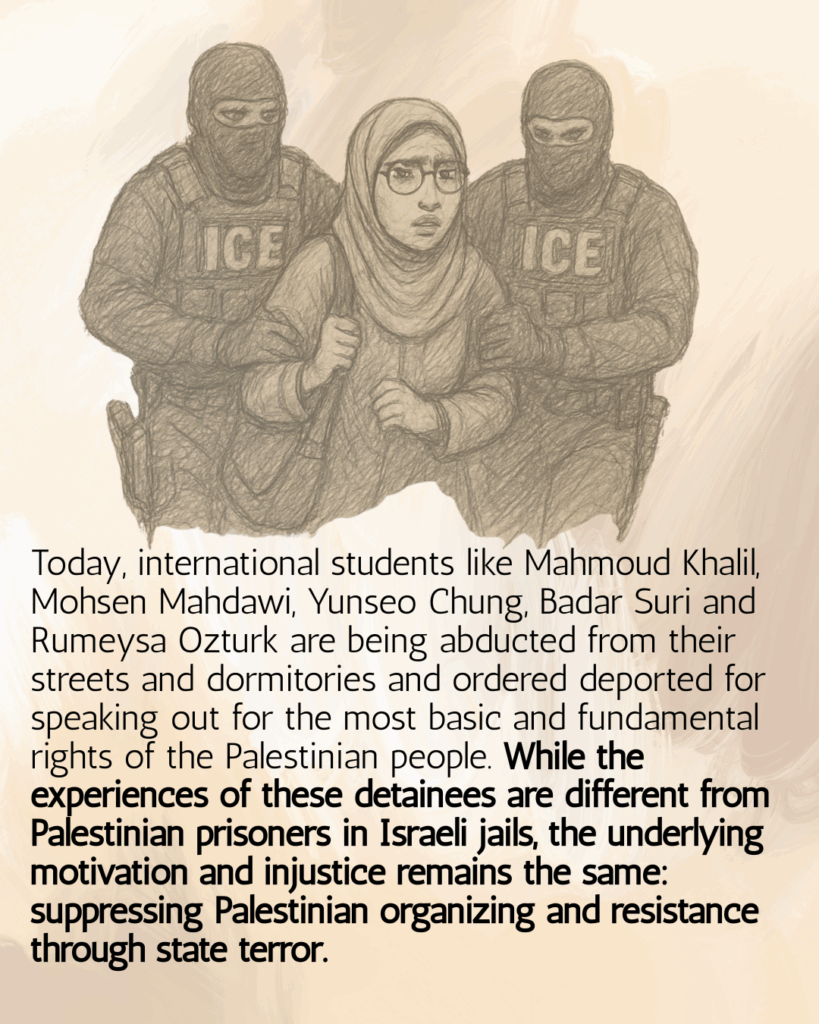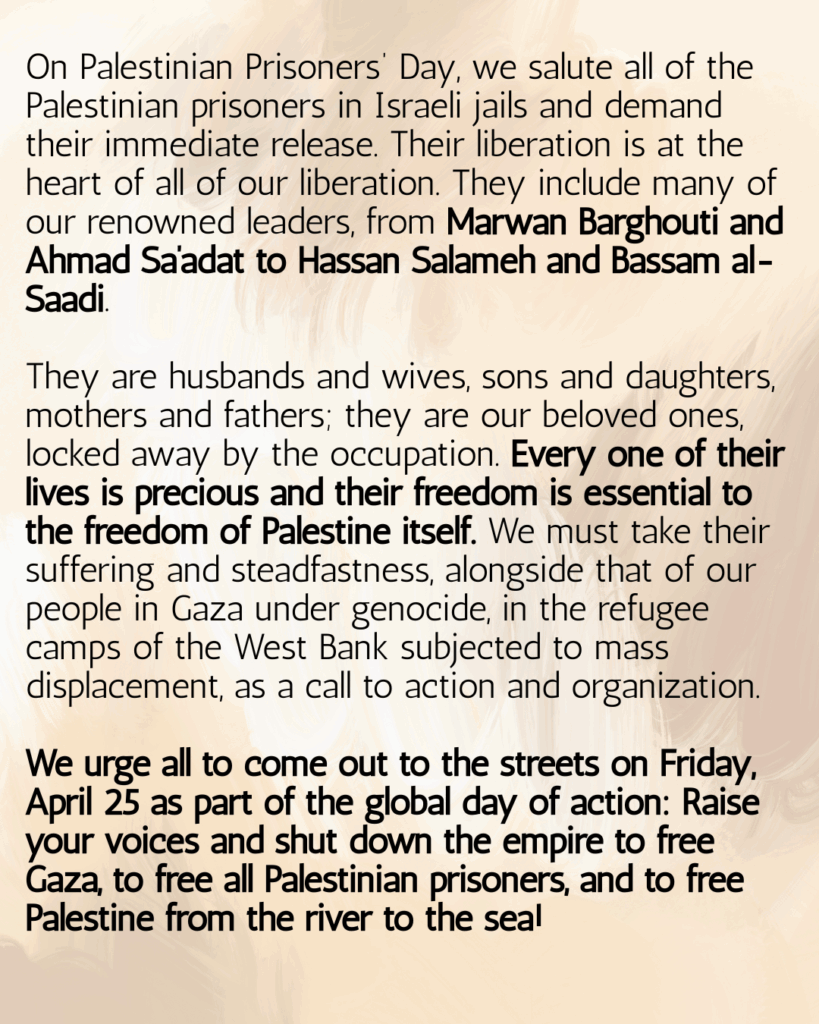
Every year, the Palestinian people and the people of the world commemorate April 17 as Palestinian Prisoners’ Day to highlight the struggles of Palestinian prisoners inside the occupation prisons and amplify calls for their liberation. As we mark Palestinian Prisoners’ Day this year, our prisoners and our people as a whole – especially in the Gaza Strip, and throughout occupied Palestine – are facing a genocide, carried out by the Israeli occupation regime, backed and funded by the United States.
The Palestinian prisoners are at the center of the struggle: confronting starvation, torture and extreme repression inside the occupation prisons, yet continuing to play a leading role in the Palestinian resistance. They do not stand alone; every family in Palestine has been affected by the colonial prison system in one way or another. The prisoners are healthcare workers, teachers, students, organizers, beloved family members, those struggling for their community and land, and Palestinian children targeted for their very existence..
Since 1948, there have been approximately one million Palestinians imprisoned by the occupation, from the forced labor and expulsion camps of the Nakba to today’s military torture camps and maximum-security prisons with 24/7 surveillance. Today, inside the prisons, they are subjected to torture, starvation and the denial of the most basic rights, all of which had been obtained through the struggle of the Palestinian prisoners’ movement. Palestinian prisoners are denied family and lawyer visits. When they emerge from imprisonment – as in the prisoner exchanges from January through March 2025, achieved by the Palestinian resistance – they are emaciated and in poor health, denied access to medical care for months and years on end.
Today, there are:
Administrative Detention: No charge, no trial
These numbers include 3,500 Palestinians held under “administrative detention.” First introduced into Palestine under the British mandate, administrative detention has become one of the primary methods of repression and control of the Palestinian population. Palestinians are jailed with no charge and no trial, under a so-called “secret file” that is denied to even the detainee’s lawyer. These orders are indefinitely renewable; as a result, Palestinians often are jailed for years under these arbitrary detention orders, which are used en masse to target thousands of Palestinians.
The Abductees of Gaza
Thousands of Palestinians from Gaza have been abducted by invading genocidal forces, often rounded up in refugee camps, schools serving as housing for the displaced, and health care institutions and hospitals. During the past 18 months, at least 4,000 Palestinians have been held in just the Sde Teiman prison camp, perhaps the most notorious for extreme physical, sexual and psychological violence, where at least 36 Palestinian prisoners were killed by occupation forces. Palestinians abducted from Gaza reflect the targeting of hospitals and health as a mechanism of genocide; they are held as so-called “unlawful combatants,” under which the “Israeli” state claims it can hold them indefinitely. They include Dr. Hussam Abu Safiya, the director of Kamal ‘Udwan hospital, whose son was killed by occupation forces before he was abducted after the invasion and destruction of most of the hospital. His fellow doctors, Dr. Iyad al-Rantisi and Dr. Munir al-Bursh, were murdered under torture, assassinated in these prison camps. The occupation has consistently refused to release the full numbers, names and statistics about the Palestinians it has abducted en masse from Gaza amid the genocide.
Women Prisoners
There are currently 29 women prisoners inside the Zionist jails, including two pregnant women. During the prisoner exchanges achieved by the Palestinian resistance, 71 women were liberated from Israeli jails. Since that time, the occupation has in many ways escalated its targeting of Palestinian women. They include Aya Khatib, a Palestinian woman from occupied Palestine ‘48 sentenced to four years in prison for fundraising to support people in Gaza living under siege and genocide, and students like Ruba Nasser and Karmel Khawaja, targeted for participating in student events at their universities. Women prisoners are subjected to constant surveillance, denied medical care and treatment. Palestinian women from Gaza have been particularly singled out for extreme abuse, including sexual assault and repeated forced strip-searching.
Imprisoned Children of Palestine
Every year, at least 700 Palestinian children are dragged before Israeli military courts. There are currently 400 Palestinian children inside occupation jails, most of whom have been abducted from their homes in violent night raids; the doors exploded off of their family homes, dozens of soldiers invading their safe spaces, only to be dragged from their beds, beaten and thrown in the back of military jeeps. Palestinian children and youth are subjected to solitary confinement, torture and beatings, as well as starvation and medical mistreatment. The recent release of Ahmad Manasra after 10 years in occupation prisons, since he was 13 years old, highlighted the systematic abuse of Palestinian children in Israeli jails after he was repeatedly denied early release or meaningful medical care for physical and mental illness, instead held for years in solitary confinement. The martyrdom of 17-year-old Palestinian-Brazilian Walid Ahmad in the occupation prisons just two weeks ago, with autopsy results indicating starvation, malnutrition and untreated disease, further highlights the severe plight of imprisoned Palestinian children.
The Martyred Prisoners
Since 7 October 2023, there have been at least 64 Palestinians martyred inside Israeli jails, and over 300 since 1967. Over 70 of their bodies are still detained by the occupation, essentially held hostage in an attempt to obtain an advantage in prisoner exchange negotiations and to impose collective punishment on their families. They include Palestinians like Omar Daraghmeh and Mohammed Hussein al-Aref, assassinated under torture; Walid Daqqah, the writer, thinker and freedom fighter, assassinated through “slow killing” after years of denial of proper medical care for cancer; over 40 Palestinians from Gaza, including workers, doctors, journalists and freedom fighters, killed under extreme torture in the prison camps of the occupation. The martyred prisoners highlight the severe conditions under which Palestinians are being detained, in which starvation, beating and abuse are daily facets of life.
Confronting Repression in the US
The suffering of Palestinian prisoners inside occupation jails is paralleled in the United States amid the escalating repression of Palestinian and Palestine solidarity activism, including the use of imprisonment, disappearance and arbitrary detention to remove leaders and prominent figures from the scene, and to impose fear and terror upon the population as a whole. Ghassan Elashi and Shukri Abu Baker of the Holy Land Foundation have already spent nearly 20 years in U.S. prisons, sentenced to 65 years for charitable support for the Palestinian people. Today, international students like Mahmoud Khalil, Mohsen Mahdawi, Yunseo Chung, Badar Suri and Rumeysa Ozturk are being abducted from their streets and dormitories and ordered deported for speaking out for the most basic and fundamental rights of the Palestinian people. While the experiences of these detainees are different from Palestinian prisoners in Israeli jails, the underlying motivation and injustice remains the same: suppressing Palestinian organizing and resistance through state terror.
On Palestinian Prisoners’ Day, we salute all of the Palestinian prisoners in Israeli jails and demand their immediate release. Their liberation is at the heart of all of our liberation. They include many of our renowned leaders, from Marwan Barghouti and Ahmad Sa’adat to Hassan Salameh and Bassam al-Saadi. They are husbands and wives, sons and daughters, mothers and fathers; they are our beloved ones, locked away by the occupation. Every one of their lives is precious and their freedom is essential to the freedom of Palestine itself. We must take their suffering and steadfastness, alongside that of our people in Gaza under genocide, in the refugee camps of the West Bank subjected to mass displacement, as a call to action and organization.
We urge all to come out to the streets on Friday, April 25 as part of the global day of action: Raise your voices and shut down the empire to free Gaza, to free all Palestinian prisoners, and to free Palestine from the river to the sea!





